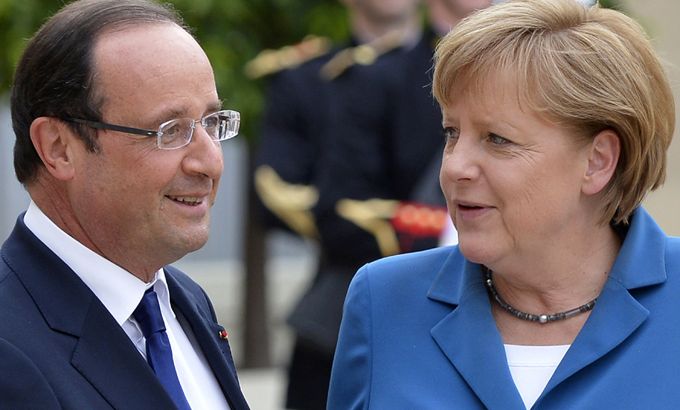
Is closer European integration inevitable?
As EU officials push for a fiscal and political union, we ask if this is a defining moment for Europe.
Angela Merkel, the German chancellor, was in Paris on Wednesday to try to find common ground with Francois Hollande, the new French president.
|
“They have the broad ideals there and there is some agreement on where they want to go and what they want to do in terms of the banking and the fiscal side. But the details in the policy proposal are very thin on the ground.“ – Raoul Ruparel, the head of economic research at Open Europe |
The two leaders are deeply divided over how to deal with Europe’s financial crisis.
Keep reading
list of 4 itemsEcuador weighs security, international arbitration in latest referendum
‘Triple spending’: Zimbabweans bear cost of changing to new ZiG currency
Boeing hit with 32 whistleblower claims, as dead worker’s case reviewed
Hollande has made growth his priority, and has openly challenged Merkel’s insistence on austerity. It is the first split between Berlin and Paris since the debt crisis began 30 months ago.
And there are likely to be more battles ahead as a crucial European Council meeting begins in Brussels on Thursday.
Officials are pushing a radical proposal to turn the eurozone into a fully-fledged political federation within a decade.
Germany is in favour of more economic and political integration, but other countries, like France and Britain, are reluctant to give up some of their national sovereignty.
So what is this European Commission plan actually proposing?
Basically it will mean more power for the European authorities, which will include setting limits on how much debt each country can take on, with the power to veto national budgets if a country is likely to go over that.
|
“Markets are not accountable to the European public so really what we should be thinking about is what the people of Europe want and that’s not really being taken into account …. What is happening in Europe is that taxpayers are having the full burden of costs thrust on them … and that is unfair.“ – Anne Pettifor, the director of Prime |
It also proposes creating a European treasury office to control a central budget and monitor national ones. And a new European banking union will also be established to supervise big national banks.
But perhaps the most contentious point of all is that it proposes deeper political integration through joint decision-making with national parliaments.
Jose Manuel Barroso, the European Commission president, said the plan was a defining moment for European integration.
“A vicious circle has become established whereby the use of taxpayers’ funds to rescue banks makes sovereigns weaker while increasingly risk adverse banks stop lending to businesses that need funds, making the economy and the banking sector with it, slow down, which again further weakens the sovereign.
“We can break this negative cycle now if you are bold enough to establish a strong and integrated financial framework. For a genuine economic and monetary union to be established, I think we need a banking union, a fiscal union and further steps towards a political union.”
Earlier this month, David Cameron, the British prime minister, said he backed closer integration among the 17 eurozone countries but made it clear that Britain would not be involved.
So the proposal includes a banking union, a fiscal union and steps towards a political union but is it the answer to the euro crisis?
Joining Inside Story, with presenter Shiulie Ghosh, to discuss this are guests: Raoul Ruparel, an economist and the head of economic research at Open Europe, a eurosceptic think tank; Anne Pettifor, the director of Prime, a London-based economic think tank and a fellow at the New Economic foundation; and George Kratsas, a specialist in sovereign funds and EU law and a teaching assistant at University College London.
|
“I have no doubt that the single currency countries will want to seek greater integration – that is clearly going to happen over the coming months and years. Britain’s not in the single currency, we won’t be joining the single currency so we won’t take part in that integration. But we know that it’s necessary for the single currency to deal with these issues so that it can work properly in the future.” David Cameron, the British prime minister |
THE EUROPEAN COMMISSION PROPOSAL:
- A new draft proposal calls for greater fiscal union among EU countries
- The new proposals will be debated at the EU summit on Thursday and Friday
- The draft proposal is intended to protect the currency and strengthen the eurozone
- The proposal would give the EU more power over national budgets
- The draft includes plan for governments to collectively agree on debt levels
- The draft also includes proposal for a future common treasury
- France and Germany are divided over the proposal for fiscal union
- Some say the plan will not address current debt problems